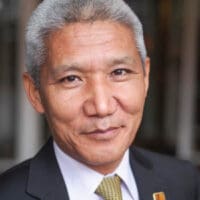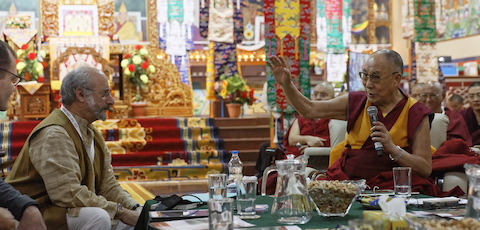Filmed during Mind & Life Institute’s “Mind & Life XXX: Perception, Concepts, and Self” on December 14, 2015.
Perception, Concepts and the Self: Perspectives from Western Science and Philosophy
SPEAKERS: His Holiness the Dalai Lama, Richard J. Davidson & Jay Garfield
We introduce the central themes of this meeting, discussing from scientific and philosophical perspectives the key questions in the study of perception, concepts and the self that will be considered this week. We discuss the constructive nature of cognition, the possibility and possible nature of preconceptual cognition, and distinctions among different concepts of the self as articulated both in the Western philosophical and scientific and Buddhist traditions, as well as the origins of these concepts in our biology. We discuss the possibility of neural and cognitive plasticity in each of these domains and, where there is evidence, the impact of different forms of contemplative training on these processes will be reviewed. We attend to the variety of methodologies for studying these phenomena, the potential for collaboration between the Tibetan and Western traditions, and the implications of these questions for ethical development and for education in secular ethics.
Does our Perception Mirror Reality? Theories of Perception in Buddhist Epistemology
SPEAKER: Thupten Jinpa
Systematic theory of perception first emerged in Buddhist thought in the writings of Dignāga (circa fifth century). He defined perception-arising from the convergence of object, sense faculty, and awareness-in terms of absence of conceptuality, the latter involving “associating names and kinds to the object.” Dharmakīrti (seventh century) developed this view further and defined perception as “cognition free of conceptuality and undistorted.” For both these thinkers, perception relates to unique particulars that constitute the real world while conceptual cognition relates to general characteristics that are constructs of our own thought. Subsequent developments, especially by Dharmottara (eighth century), ushered in a more “active” view where perception acquires a more “ascertaining” character and is seen as intimately connected to the arising of correct perceptual judgment and action readiness.
These Buddhist epistemologists view perception as apprehending its object by assuming an “aspect” or phenomenal form imprinted upon the cognition through the contact of the object with the sense faculty. Although veridical sensory experience, especially visual awareness, is taken to be paradigmatic, perception is not confined to the sensory modalities alone. It includes mental perception as well.
This presentation situates Buddhist epistemology in its historical context, and focuses on two points: 1) how perception is defined, and 2) how the insistence on perception being free of conceptuality raises important tensions within Buddhist epistemology, especially for the key question of how our perception and thought interact in creating an integrated cognitive experience of the world.
MODERATOR: Roshi Joan Halifax
INTERPRETER: Thupten Jinpa
PANELISTS:
His Holiness the 14th Dalai Lama
Lera Boroditsky
John Dunne
Wendy Hasenkamp
Bryce Johnson
Catherine Kerr
Tenzin Lhadron
Geshe Lhakdor
Thabkhe Lodroe
Geshe Dadul Namgyal
Werner Nater
Geshe Lobsang Tenzin Negi
Vasudevi Reddy
Matthieu Ricard
Yangsi Rinpoche
Pawan Sinha
Professor Geshe Yeshe Thabke
Khenpo Sonam Tsewang
David Vago
Christy Wilson-Mendenhall
Carol Worthman
Participants

His Holiness the 14th Dalai Lama
Honorary Board Chair

Richard J. Davidson, PhD
William James and Vilas Research Professor of Psychology and Psychiatry and Founder & Director of the Center for Healthy Minds, University of Wisconsin-Madison. Founder and Chief Visionary for Healthy Minds Innovations, Inc.


Thupten Jinpa, PhD
Board Chair Emeritus, Mind & Life Institute



